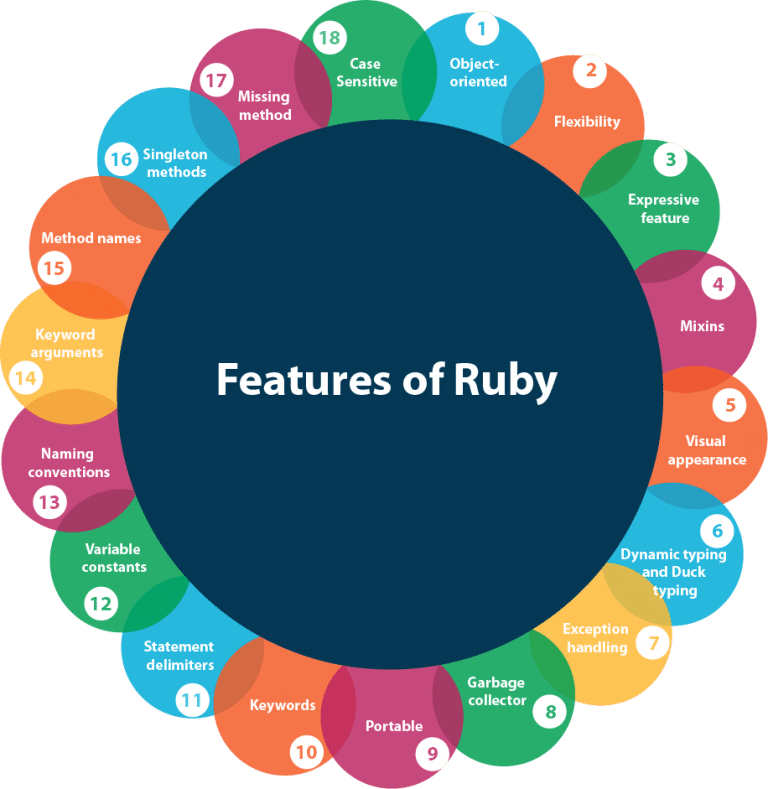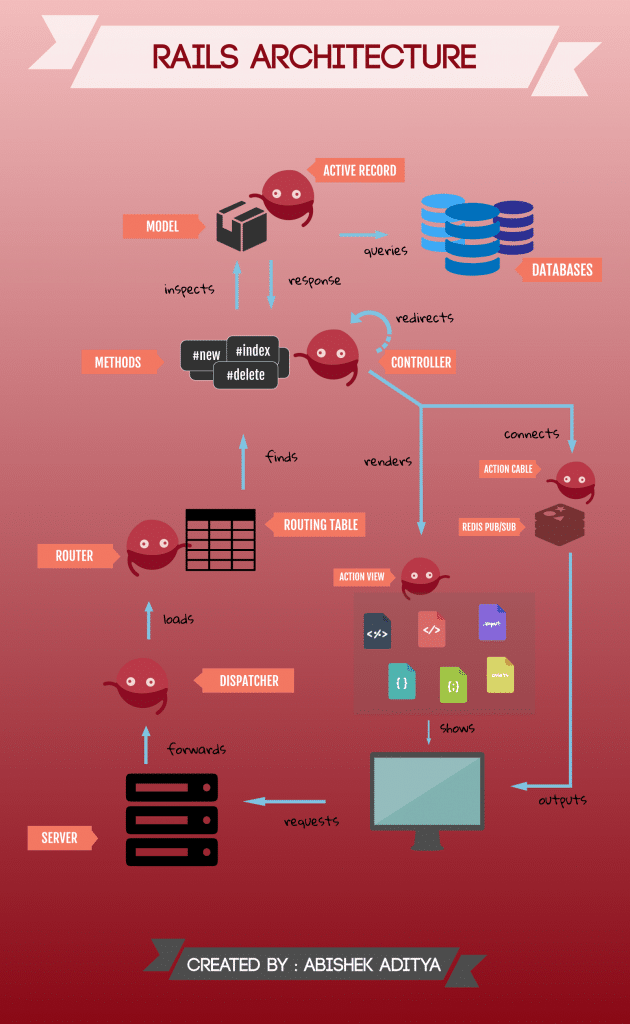
Pros and Cons of Ruby on Rails for Web Development
Why Use Ruby on Rails for Web Development: Choosing the Right Technology
Ruby and Rails is a popular web development framework created by David Hansson in 2004 to improve developer productivity without compromising with the quality of the code.
Since then, Ruby on Rails for Web Development has powered nearly 3 million websites and applications. There are countless pros and cons of Ruby on Rails, making it the developer’s first consideration for web projects.
While there are other Ruby on Rails web development framework like Selenium and Watir, nothing comes as close to MIT-licensed Ruby on Rails.
Ruby on Rails for Web Development: Difference between Ruby and Ruby on Rails
Ruby is a powerful programming language. It is an interpreted object-oriented programming language created by Yukihiro Matsumoto in 1995. The aim was to reduce the complexity of coding for web applications. Ruby on Rails consulting focuses on eliminating redundancies and reducing the development time.
Ruby on Rails is a web development framework of Ruby. By using the Ruby programming language, developers can build high-performance web applications.
Beginners may confuse Ruby on Rails framework with Ruby. The framework is synonymous with the programming languages these days because of its high popularity, but such should not be the case.

Ruby on Rails Web Development Specialization with Development Architecture
Ruby on Rails was built to deliver rapid products. It is often called as the “startup technology” because of its rapid MVP capabilities. The Ruby on Rails community loves the framework for its quick product releases.
Ruby on Rails applications are built using the MVC (Model-View-Controller) principle. Model focuses on the relationship between the object and the database. View involves the templates that are used to build data views for users of the applications. Controller integrates the model and view for web app development.
It closely follows the Convention Over Configuration and Doesn’t Repeat Yourself principles as well. Ruby on Rails is known for the initial setup which might sound rigid but is actually an advantage over flexible frameworks like Django and FLASK.
Pros and Cons of Ruby on Rails
Ruby on Rails developers extensively uses the framework to build all sorts of applications ranging from consumer-focused to enterprise apps. It is a fast framework with a plethora of benefits.
However, there are some Ruby on Rails advantages and disadvantages for web development you should consider while building large-scale enterprise applications.
Here are the Ruby on Rails pros and cons that will help you decide whether Ruby on Rails applications are worth it or not:-

Is Ruby on Rails Good for Web Development?
Following are some of the pros of Ruby on Rails that showcase why it is the perfect technology for building powerful web apps:-
- Rapid Product Development
- Probably one of the biggest pros of Ruby on Rails is rapid product development. Developers and enterprises often quote that the web development framework reduces their development time by almost 25% to 40%.
- Ruby is an easy-to-learn, simple, and clean programming language with low complexities in syntax. One of the unique benefits of Ruby on Rails is that it enables developers to quickly write codes and develop the product.
- On the other hand, there are several libraries, tools, and RubyGems, which reduce the hassle of writing enormous code and allow adding rich-features to the application.
- The pre-built conventions and the sleek programming language make Ruby on Rails development faster and maintenance of the application, simpler.
- Since products can be developed much faster, it provides more time-to-market them. It is one of the significant benefits of RUby on Rails, which is why startups love the framework.
- Cost-effective Applications
- If you want to avoid putting a hole in your budget while web development, Ruby on Rails consulting is one of the best choices you could opt for.
- Since it boasts of rapid development, you don’t have to spend a lot of time and money on the development stage. Quick development means less expenditure on things that could take time.
- RoR developers are available at competitive prices in the market. Since it has an easy learning curve, the framework is the first choice for beginner web developers.
- There is a huge supply of expert developers, allowing you not to spend a ton of money on web development. The maintenance of your application doesn’t require massive investment as the simplicity of the framework make it really easier to hire people for Ruby on Rails consulting.
- Ruby on Rails is an open-source framework, so there’s no need to pay any licensing fees as well.
- Active Ruby on Rails Community
- Ruby on Rails has the largest repository on GitHub. Since the framework is open-source, it is supported by a vibrant Ruby on Rails community making continuous upgrades to ease development.
- Ruby on Rails developers in the community is constantly adding new features to the code-base, making it simpler for developers to utilize the framework.
- The active community regularly fixes the security and other issues that might hinder development. Thus, developers don’t have to worry about security threats, considering Ruby on Rails pros & cons are not limited to the security aspect.
- Members of the community are always available to help fellow developers in the development process. They have already built an enormous database of RubyGems which allow developers to add functionality without writing code.
- A Large number of Popular Ruby Gems
- It is a high probability that the feature you want to add in your web application by writing code is already available in the form of RubyGem.
- There are RubyGems available for almost any feature you want to use in Ruby on Rails for web development. With over 5000+ RubyGems, Ruby on Rails is one of the biggest library-based frameworks.
- RubyGems reduce the time in coding by providing installation for a feature. These gems do not reduce the loading speed of the application as they are really compact in nature.
- From adding an ecommerce plugin like SpreeCommerce to debugging the application, there is a RubyGem for a wide variety of features. RubyGems is one of the best pros of Ruby on Rails, reducing the development time twofold.
- One can say that RubyGems is the most favorite thing for Rails developers, and all thanks go to the vibrant Ruby on Rails community.
Check out the list of top 10 RubyGems regularly use in Ruby on Rails Projects
- Follows Best Development Standards
- Another significant pro of Ruby on Rails is that it follows the best development standards and practices involved in web development.
- The framework follows already established software design principles, reducing the time taken to set up the development environment for Ruby on Rails applications.
- The convention over configuration paradigm encourages developers to follow a conventional approach and specify unconventional app features separately.
- Ruby on Rails web development company focuses on the principle of don’t repeat yourself, encouraging developers to write clear and concise code without any code duplication.
- These principles allow better code readability so that if new Ruby on Rails developers are assigned to the project, they can easily continue from where the previous developers left.
Keep Reading: Top Ruby on Rails Web Development Mistakes Companies Should Avoid
What are the Disadvantages of Ruby on Rails?
- Run-time Speed
- Ruby on Rails experts are not particularly happy with the run-time speed of web applications built with the popular framework. The pros and cons of using Ruby on Rails highlight this issue everywhere.
- The slow runtime speed doesn’t allow you to easily scale your applications. However, it is perfect for small applications which don’t have a million users and multiple databases to handle.
- Compared to other frameworks like Django and GoLang, Ruby on Rails might appear a bit slow. However, it works perfectly even when large traffic needs to be handled, if the databases are managed properly.
- With the introduction of Rails 6.0, there are added features which have made the Ruby on Rails community incredibly happy. It provides simultaneous connections for multiple databases, allowing more users to run the application at the same time.
- Lack of Flexibility
- Web frameworks like Ruby on Rails are an excellent choice for building standard web applications. However, when it comes to flexibility, the framework suffers a lot of criticism.
- There are a lot of default objects set during the configuration, Ruby on Rails programmers often complain about the lack of creativity.
- A lot of dependencies and modules like routing configuration, database migration, etc., are shipped with the framework, and one cannot change them.
- The lack of flexibility is one of the major cons of Ruby on Rails, which is also the reason enterprises that want flexible and enterprise apps rarely utilize it.
- Improper Documentation
- Ruby on Rails suffers from a lack of documentation for RubyGems and libraries that are heavily mixed with the framework.
- Documentation is present mostly in the form of test suite, which means you’ll have to dive deeper into the code for lesser-known RubyGems and libraries. Ruby on Rails advantages and disadvantages also need to be properly documented, along with its workings.
- The lack of documentation is another of the major cons of Ruby on Rails as developers often struggle to find the right approach to install a library or gem and work with it.
- Huge Cost for Mistakes
- The entire Ruby on Rails community would agree that making mistakes can cost heavily while building a web application with the framework.
- Since it encourages quick prototyping, developers often make mistakes in a hurry, which may not be easily identified and often come to notice when it’s too late.
- The dependencies are tightly coupled with each other, which means can’t make changes easily with Ruby on Rails.
- Mature Framework
- This might not be considered as one of the cons of Ruby on Rails but is a challenge that the framework is struggling to recover from.
- With the advent of more modern frameworks like Django, sceptics say that Ruby on Rails is a dead framework because it cannot evolve to meet the growing needs in modern software development.
- Ruby on Rails isn’t the right choice for machine learning applications, and enterprises are often sure that it has little or no part to play in digital transformation.
Read Also: Ruby on Rails Development Challenges
Is Ruby on Rails worth it in 2021?
Ruby on Rails is still worth it in 2021. If you are looking to build rapid web applications at a cost effective price, then Rails is the framework for you. It has tons of widely popular RubyGems that ensure developers achieve efficiency and productivity.
Since 2021 is the year where companies are moving towards digitization and want to achieve economies of scale to cover their losses, Ruby on Rails framework appears to be the right choice.

Learn Ruby on Rails for Web Development: Yay or Nay?
If you want a small-scale application with powerful features, Ruby on Rails for web development is the way to go. It offers you everything that is needed for an application that doesn’t have a large audience. The above pros and cons of Ruby on Rails provide a clear view of how the framework can help in building dynamic web applications.
For a large-scale application, Ruby on Rails might be a poor framework. Needless to say, with Rails 6.0, the multiple database connection capabilities have certainly upped the game. If you are a startup looking for an affordable web application, you should definitely go for Ruby on Rails.
BoTree Technologies is an experienced Ruby on Rails agency, building powerful web applications at an affordable price.




